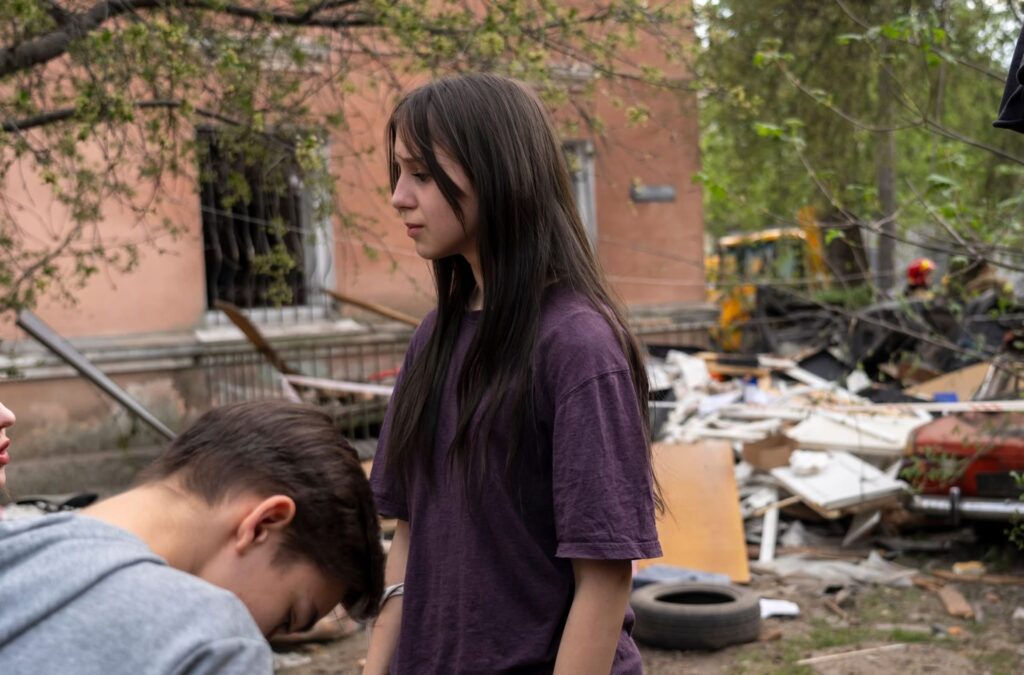“Imagine you’re wearing a backpack. Not for a day, not for a week — for three years. You sleep with it, play with it, go to school with it. That backpack is fear.”
This is how Oksana Pisareva, a psychologist at the Voices of Children foundation, describes the emotional burden Ukrainian children have carried since Russia’s full-scale invasion began.
“It’s a backpack you can’t take off,” she continues. “You fall in love, go to sports practice, celebrate your birthday — and that weight is still there. The fear, the anxiety, the sense that you are not safe.”
Three years into the war, millions of Ukrainian children are growing up in its shadow. Some have lost family. Some have been displaced. Many live under constant threat. But nearly all carry invisible wounds — and psychologists like Pisareva are working to help them heal.
Stories that leave scars
Pisareva has worked with many children whose trauma defies belief. One story haunts her: a teenage boy killed in a missile strike in Kyiv, along with his entire family.
“His classmates waited for hours near the ruins, refusing to leave,” she recalls. “They were crying, hoping. One child died — but 25 more experienced that grief.”
The strike took place on the night of 24 April 2025 — one of the deadliest Russia has launched on Kyiv since the full-scale invasion began. Twelve people were killed, and nearly 90 were injured. Even US President Donald Trump, horrified by the attack, posted on social media: “Vladimir, STOP!” — urging Russian President Vladimir Putin to stop bombing civilians.
“There are stories I would like to forget,” Pisareva says. “But I can’t. They leave scars — on children, and on us.”

What Ukrainian children fear most
“The biggest fear during war is to die,” says Pisareva. “Whether we admit it or not, we live with that fear because we see mortality everywhere.”
Children rarely speak this fear directly. Instead, they voice more tangible anxieties: the fear of losing parents serving in the military, siblings at the front, or close friends. Teenagers often express fear about the future, unable to imagine life beyond the war.
The widening psychological toll
Across Ukraine, trauma among children is widespread. A 2024 study by Save the Children found that 43% of Ukrainian children are showing signs of psychological distress — anxiety, irritability, sleep disturbance.
Among those referred for psychological support, the situation is even more stark: 70% of children and adolescents met the criteria for PTSD, and 95% of preschool-aged children in treatment also showed PTSD symptoms, according to mental health researchers.
Pisareva confirms what these numbers suggest. “We see eating disorders, self-harm, suicidal thoughts. It’s heartbreaking how early depression now begins,” she says. “Some cases go beyond what we can treat alone — we need psychiatrists, medication. And these are children.”

A childhood cut short
“When you’re always under stress, you have double pressure during each developmental stage,” Pisareva explains. “They should be busy being kids. But they can’t.”
With more than 1,600 schools damaged or destroyed and 737,000 children internally displaced, the basic anchors of childhood — education, safety, and freedom to explore — have been swept away.
Pisareva worries deeply about the long-term effects of this loss.
“I’m afraid they’ll become too adult, too serious, too gloomy too soon,” she says. “When you go through trauma too early, it’s very hard to return to that sense of lightness later. But it’s so important — to be spontaneous, to be joyful, to just celebrate life.”
And at the core of all this, she adds, is the simple but profound need for stability:
“Children need a basic sense of safety to grow — emotionally, psychologically, even physically. Without that, they can’t go through their natural development. We try to create it for them, but the environment works against us.”
Hope — and urgency
Despite everything, Pisareva believes healing is possible.
“Children have an incredible ability to heal — especially when they are loved, supported, and believed in. They may not forget what they’ve been through, but they can still grow, still laugh, still dream.”
But time is running out.
“Childhood has a deadline,” she says. “You’re a child until 18. That time won’t wait for the war to end. We have to help them now.”
Voices of children: One child at a time
The Voices of Children Foundation, where Pisareva works, supported over 41,000 children and parents in 2023 alone. With centers in 14 Ukrainian cities, mobile psychological teams, and creative therapy programs (from art and storytelling to filmmaking), they provide trauma care tailored to each child’s needs.
“Every child has a personal story,” says Pisareva. “We try to respond personally. That’s the only way through.”

A generation marked by war — and strength
As Ukraine’s children navigate grief, fear, and uncertainty, their resilience remains a source of hope.
“They’re learning something powerful — that peace is not guaranteed. That it’s valuable,” says Pisareva. “Maybe they’ll build a world that’s better than the one we gave them.”
This interview was conducted by Euromaidan Press in late May 2025, ahead of the traditional 1 June observance of Children’s Protection Day. However, on 30 May, President Volodymyr Zelenskyy signed a decree moving the holiday to 20 November to align with World Children’s Day and the UN Convention on the Rights of the Child. The change also reflects Ukraine’s broader effort to break from Soviet traditions and adopt international norms. Despite the date change, the urgency of protecting Ukraine’s children remains unchanged.



